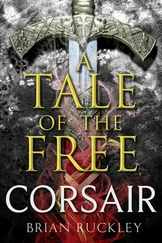Hector sensed the Jew’s scepticism. ‘Please hear me out. If the Emperor discovers that a captive of such high value has slipped through his fingers, both of us will suffer.’
Maimaran bridled at the warning. Such implied threats often came from those who sought to profit from his disadvantaged status as a Jew.
‘What do you think is the real value of our French prisoners?’ he enquired, smoothing his black robe, then placing both hands palm down on the table in front of him.
Hector chose his words carefully. ‘Have you heard of a man known as “The Lion of La Religion”?’
‘Naturally. His reputation has reached us though he operates, if I recall, in the farther end of the Mediterranean.’
‘What do you know of him?’
‘That he is a Knight of Malta and a most virulent and implacable enemy of Islam. He is perhaps the most notorious of all the knights of the Order of St John. He has become a figure of hatred for the followers of Muhammad. They both fear and loathe him.’
‘I believe he is now here in Meknes and held captive among the French prisoners from the galley.’ Hector made the statement with as much certainty as he could muster.
‘That, if I may say so, is hardly likely,’ Maimaran replied. There was an edge of sarcasm in his voice. He was losing patience with his visitor. ‘If the Order of St John knew that a leading member of their order was in the Emperor’s custody, the grand council would already have opened negotiations with His Majesty for the knight’s redemption.’
‘That would be true if the Lion of La Religion were a knight of the Order of St John. But he is not. He belongs to the Order of St Stephen. The two orders are easily confused. They share the same symbol, the forked cross. I gather that the Order of St Stephen has almost abandoned the crusading zeal.’
‘And now you tell me that this knight was aboard the French galley? That seems even more difficult to believe.’ Maimaran remained incredulous.
‘My informant is someone who knows the knight well, and has served under him.’
‘And why has this informant not come forward before?’
‘Until yesterday he was unaware that the Chevalier, as he is known, was among the prisoners.’
‘And is he so sure that he is the right man that he can persuade others to believe him?’ When Hector hesitated in his reply, Maimaran sensed that he had touched on a weakness in the young man’s argument so he pressed his point. ‘Your witness would have to give clear evidence about this so-called Chevalier’s identity.’
Hector looked directly at Maimaran. ‘That would be difficult,’ he admitted. ‘My witness is a mute. He lacks a tongue.’
Despite his usual self-restraint, Maimaran gave a derisive sniff. ‘So your chief witness is dumb! How can you expect anyone to believe such a wild fiction.’
‘There is evidence which supports his claim,’ said Hector. He had expected that it would be difficult to convince Maimaran, and he knew his only hope of persuading him was to engage his curiosity. ‘When your assistant visited the prisoners this morning, was he able to learn the name of the Frenchmen’s galley?’
‘Of course. Without knowing the vessel’s identity, we could not begin to open negotiations with the French.’
‘And that name?’
Maimaran failed to see what was the point of Hector’s question. ‘Surely you know yourself,’ he said irritably. ‘Were you not an oarsman on her crew?’
‘Yes I was,’ answered Hector. ‘But it is important that these details come from an independent source.’
Maimaran sighed. ‘The galley was named St Gerassimus . I thought it an unusual name when my assistant told me. But then I know little of these maritime traditions, except that the Christians often give saint’s names to their ships, believing them to bring divine protection.’
‘Are you familiar with the story of St Gerassimus?’
‘I have not the least idea of who he was or what he did.’
‘Then perhaps you will have heard of the story of Androcles and the Lion.’
‘The fables of Aesop are known to me.’
‘The tale of St Gerassimus is very similar. He was a Christian monk living in the desert. One day he removed a thorn from the paw of a lion, and thereafter the lion came to live with the saint, and protected him from his adversaries. Whenever anyone threatened St Gerassimus, his lion attacked his aggressors. You might say that the lion with the wounded paw became the saint’s protector.’
‘And now you are telling me that the Lion of La Religion is another St Gerassimus?’
‘No. St Gerassimus represents the Faith, and the Chevalier sees himself as the Lion fighting to protect it.’
‘And how would he have arrived at that strange vision of himself?’
‘The Chevalier carries injuries on both feet. The injuries, now healed, were inflicted on him by the Muslims. According to my informant, the Chevalier was captured by Muslims early during his career. He was already known as a cruel and ruthless enemy of Islam, so they tortured him before releasing him in a prisoner exchange. Before letting him go, his captors branded the sign of the cross on the sole of each foot. It was their form of revenge for the Chevalier’s fanaticism. They humiliated him by making sure that for the rest of his life, with each step that he took, he would tread on the symbol of his faith.’
Maimaran’s mouth twisted in a grimace of distaste. ‘And you learned all this from your mute informant? He seems remarkably well informed.’
‘He was there when the knight was tortured. He saw it for himself.’
‘And why did he not suffer the same fate?’
‘The Muslims took pity on him because already his tongue had been torn out.’
‘And why was that?’
‘He tried to explain to me but it was difficult to follow the details. But I did learn that it was the Chevalier who had ordered his mutilation.’
There was a long silence while Maimaran considered Hector’s tale. The young man’s claim seemed altogether too fanciful. ‘Can anyone else testify to the supposed identity of this prisoner?’
Hector shook his head. ‘I pulled an oar on the galley St Gerassimus but I never saw the Chevalier close enough to identify him now. As commander he joined the vessel shortly before we left harbour, and throughout the short voyage he stayed in his cabin or on the stern deck with the other officers. All but a handful of the other oarsmen are dead. They drowned, chained to their benches when the galley sank. Only the men on my oar bench got ashore, and one of those, a big Turk, never made it.’
‘What about the other French prisoners, would they testify?’
‘From what I have seen they are highly disciplined and loyal to the Chevalier. They would lie to protect him.’
‘Is there anything else which makes you think this mute is telling the truth?’
Hector shook his head. ‘The only other thing I can think of is the banner flown on our galley. It was the private flag of her commander. It showed the Five Wounds of Christ. Maybe that, too, referred to the injuries that the Chevalier had suffered at the hands of his enemies.’
Maimaran half-closed his eyes, and for a moment Hector thought that the elderly Jew was about to fall asleep. But the ransom broker was pondering his best course of action. If he went to Moulay with a tale that proved to be false, the Emperor was sure to fall into one of his murderous rages. Yet the young man seemed to be speaking in earnest, and there might yet be some slight substance to his extraordinary claim about the identity of one of the French prisoners. Maimaran opened his eyes and looked down at his hands. ‘So what do you suggest?’
‘We set a trap to unmask the Chevalier. The leader of the Frenchmen, a man named Piecourt, has twice asked for word of their capture to be sent to Jewish ransom brokers in Algiers. He tried to get a friend of mine to send this message soon after the Frenchmen were taken by the amazigh, and then yesterday Piecourt made exactly the same request to me. He mentioned the name Iphrahim Cohen. It seems that Cohen in Algiers would know who the prisoners are, and would be prepared to obtain their release.’
Читать дальше








